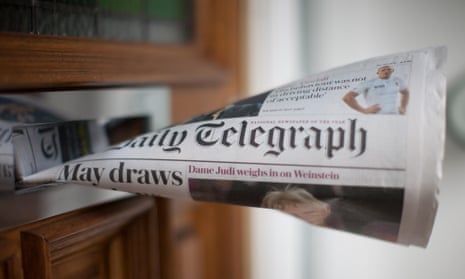The Daily Telegraph has stopped publishing paid-for propaganda on behalf of Chinese state media, amid growing scrutiny of how Beijing is using the pandemic to grow its influence in English-language media aimed at western audiences.
The long-running China Watch section, funded by the government-controlled China Daily news outlet, has appeared in the Telegraph for more than a decade. The content, written by Chinese state journalists, presents relentlessly upbeat views on China’s standing in the world in both print supplements and on a branded section of the Telegraph’s website.
However, in recent days the dedicated content has been wiped from the Telegraph’s website along with another section that reproduced material from China’s People’s Daily Online – the official outlet of the country’s ruling communist party.
Articles deleted by the Telegraph as part of the removal had headlines such as: “Why are some framing China’s heroic efforts to stop coronavirus as inhumane?”; “Traditional Chinese medicine ‘helps fight coronavirus’”; and “Coronavirus outbreak is not an opportunity to score points against China”.
The Telegraph would not comment on why it is no longer running the lucrative branded material, with one report claiming that the newspaper was paid about £750,000 a year for reproducing the China Daily material. In common with the rest of the newspaper industry, the Telegraph is battling both a pandemic-induced fall in print sales and a collapse in the advertising market, while also trying to avoid becoming collateral damage in the fraternal feud between its two owners, the Barclay brothers.
The removal of the paid-for sections comes as China aims to improve its standing with western audiences amid the pandemic, with substantial investment in its CGTN rolling news channel and the growing role of vocal English-language diplomats who use Twitter to forcibly make their arguments.
In return, the country is facing an increasingly hostile reception from parts of the British media, with the Mail on Sunday spending recent weeks reporting on alleged threats to national security from growing Chinese influence in the UK.
The Telegraph has run many pieces critical of China since the start of the pandemic. The newspaper’s China correspondent, Sophia Yan, recently spent a week in Wuhan reporting on doubts about the official death toll from coronavirus, claiming the real total could be substantially higher than the authorities are admitting.
Another comment piece entitled “The Left have become China’s useful covidiots” suggested the “Chinese Communist party’s cover ups and lies” helped play a role in spreading the virus around the world. The Telegraph has also reported on how Chinese state media is buying positive coverage through Facebook adverts.
Other major global news outlets also run similarly branded China Watch sections, including the Wall Street Journal, who did not respond to a request for comment on whether they were continuing to run the section, which has not been updated for weeks.
Until recently, the New York Times carried a similar section but a spokesperson said earlier this year the outlet had made the decision “to stop accepting branded content ads from state-run media, which includes China Daily”. The Washington Post has also run China Watch in the past, although the outlet confirmed they have not run the supplement since last year.
They are the same three US news outlets that recently had their Chinese-based reporters expelled from the country.
Similar deals to reprint paid-for Chinese propaganda have been struck with newspapers around the world, including outlets in Australia, France and Germany.
